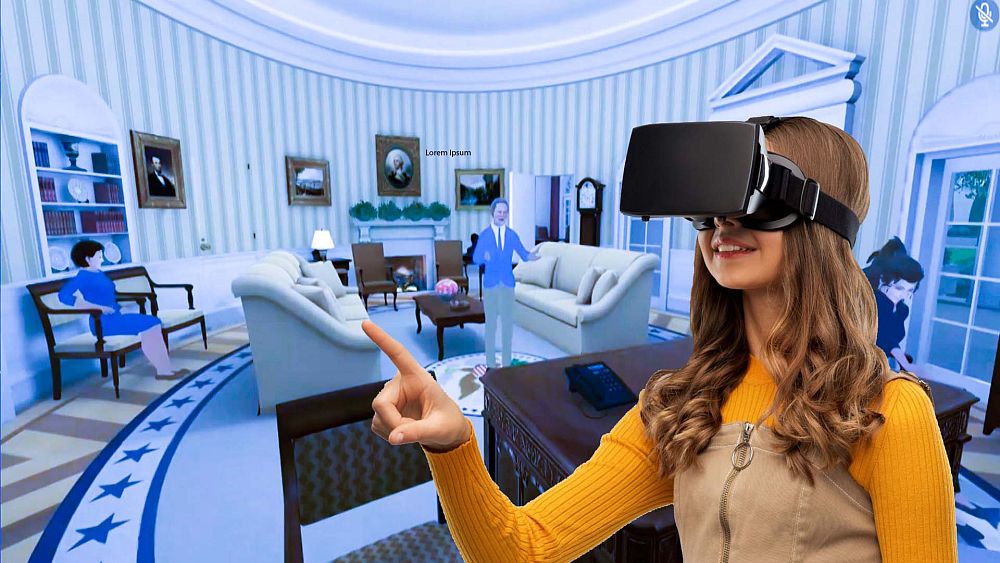The metaverse offers a seamless blending of the physical and digital worlds. It is an immersive 3D simulated environment built on the blockchain and powered by Augmented and Virtual Reality. It offers a space for learning, networking collaborating and social bonding. Simply put, the metaverse is the next iteration and the future of the internet. It’s one of the most exciting technologies to emerge in the Web 3 era.
Metaverse is showing a lot of promise for enterprises by offering them new ways to market and run their business. This type of operation is more relevant and in accordance with the current business ecosystem.
Metaverse in education is a highly potent sector. Its uses and applications in the education sector are full of opportunities. Students are mesmerized by the interactive and immersive features of a metaverse classroom. Metaverse for schools is a concept that is taking off at great speed as many educational institutions are making a beeline for the metaverse.
Let’s see how Metaverse for Schools is offering richer educational experiences for students and teachers.
Why Metaverse in Education?
Education technology has advanced in leaps and bounds and become a critical link in the delivery and consumption of education. Schools, colleges, coaching centres and individual tutors are all investing in Ed tech to offer better content as well as grow and scale their operations. Metaverse technology allows for a deeper and immersive understanding of the subject matter.
With the aid of VR technology metaverse for school can support hybrid learning. Students can first individually experience immersive learning, pre or post lesson. During the physical classes, teachers can gauge them on their learning and open the class to discussions and deliberations. The physical class becomes can inspire networking and observations and teachers can mentor instead of simply instructing the class to complete the syllabus. The educational metaverse can be a true enabler and foster collaboration and interactions within the 3D VR classroom.
The educational metaverse can strengthen and decentralize education, by removing the hurdles faced in physical 2D classrooms. It can offer unique and experiential learning through live virtual learning remotely. Students from anywhere in the world can enter the same class together, study and collaborate to solve problems. Students can visit any planet, observe all the minuscule details of a plant or animal cell, play with atoms and even first-hand experience the size and strength of a dinosaur. Virtual trips to museums and different civilizations will spark curiosity and creativity.
The educational metaverse is the future of education and metaverse for schools will be a game changer and inspire students to learn better.
Features and Benefits of Metaverse for Schools
3D classrooms
3D classrooms are live simulated spaces which can be used for meeting, learning and teaching. 3D renditions of all physical objects, allows a better conceptual understanding. Students can touch and manipulate these 3D objects to understand them better. For example, students can minutely study and observe all walls of a plant cell in 3D .This would not be possible in a physical classroom, where students could only learn from text of 2D static diagrams. Since the metaverse is not limited by locations, students can attend from anywhere and yet avail the same immersive module in a 3D virtual classroom.
Life- Like Simulation Based Learning
The metaverse can replicate any real world scenario or environment. VR labs can be set up in the metaverse for schools and students can apply theories to practice in as safe virtual space. Students can carry out experiments, develop prototypes and even build a rain forest or dive deep into the ocean to explore underwater life. The educational metaverse through its simulation based learning approach can make lessons live.
Better Learning Performance
A research conducted by PwC found that employees who took VR-enabled courses learned four times faster than those in a traditional classroom setting. The immersive experience of the metaverse, enhanced by elements such as gamification and 3D simulations, can help learners better understand and retain information. Additionally, learners in a VR setting feel less distracted and are more engaged overall.
Edverse- Building the Educational Metaverse for Schools
Studies show that kids who learn via immersive content methods (like VR) retain information better than those who learn via traditional methods. The method of imparting education is an important consideration.
– VR has learning retention of 75%…Class lectures have learning retention of only 5% and reading retention of just 10%.
Edverse is building technologically advanced metaverse classroom to help students learn more deeply and engage and motivate them.
If you’re looking to build or optimize a metaverse in education virtual world, we have the experts who can help make it happen. Connect with Edverse to discuss your project.
